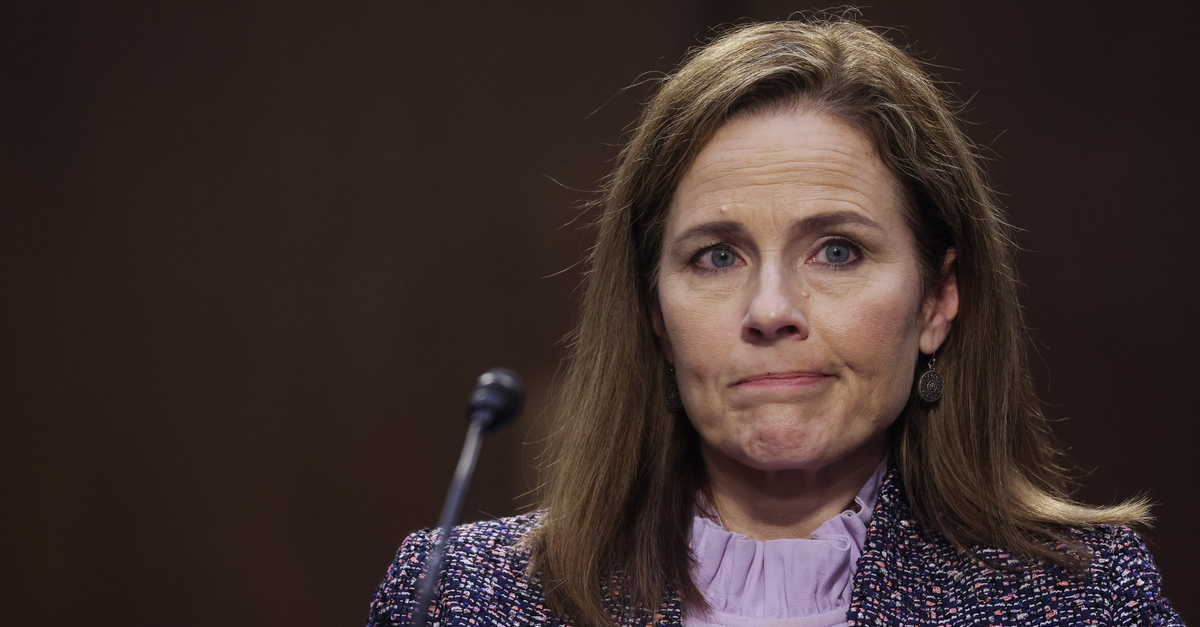
The Supreme Court, including President Donald Trump-appointed Justices Amy Coney Barrett and Brett Kavanaugh, appeared skeptical of the administration’s attempt to exclude undocumented immigrants from census apportionment. At the same time, the Supreme Court’s conservative wing questioned whether a federal court’s injunction blocking that plan as “unlawful” followed the correct procedure.
“A lot of historical evidence and longstanding practice really cuts against your position,” Barrett told Trump’s acting Solicitor General Jeffrey Wall during lengthy oral arguments on Monday morning.
For self-described originalist jurists like Barrett and Kavanaugh, the Constitution’s apportionment clause leaves little room for interpretation.
“Representatives shall be apportioned among the several States according to their respective numbers, counting the whole number of persons in each State, excluding Indians not taxed,” the clause reads.
New York Attorney General Letitia James (D) has called Trump’s memo an attempt to redefine the word “persons” in a way that has not been attempted since the time of slavery. The expansive count even long predates the Fourteenth Amendment, whose apportionment clause decisively repealed the infamous three-fifths compromise and gave formerly enslaved people the full weight of their representation in the Congress.
“There is evidence that in the Founding era an ‘inhabitant’ was a ‘dweller’ who lives or resides in a place,” Barrett noted in her questioning that won praise from Kavanaugh.
“As Justice Barrett’s questioning illuminated, I think you have advanced forceful arguments constitutional and statutory arguments on the merits,” Kavanaugh told New York Solicitor General Barbara Underwood, whose state led the coalition that blocked Trump’s memo from taking effect.
Underwood began her arguments by emphasizing the government’s inability to create reality by decree.
“The government can do many things to induce undocumented immigrants to leave but it cannot declare them to be gone when in fact they are here and likely to remain,” she declared, in statements left unrefuted by any justice. “Their undocumented status cannot erase their presence.”
The conservative wing played their cards closer to the vest in deciding whether to uphold an injunction blocking Trump’s memo, even if a majority seemed to agree the outgoing president’s pronouncement was predicated upon an illegal premise.
For the court’s right flank, the issue appeared to come down to whether the dozens of states and civil rights groups had standing to sue and whether the time is ripe for a court to take action. A three-judge panel in Manhattan Federal Court unanimously ruled that they did, but a divided trio of judges in Washington, D.C. found otherwise.
The largely blue states that brought the lawsuit warn that Trump wants to dilute their political representation for a decade by illegally excluding undocumented immigrants from census apportion, and he is attempting to accomplish through a memo exactly what the Supreme Court refused to allow him to do when it rejected his citizenship question to the census.
But Trump’s Census Bureau has not indicated how many immigrants that it wants to exclude from the count, leaving uncertain whether that number will be large enough to affect political representation as the states fear.
“In that world, we have a standing problem, don’t we?” asked Justice Neil Gorsuch, the high court’s third appointee.
Acting Solicitor General Wall refused to say whether the number will include the 700,000 Dreamers or up to 4 million other immigrants, under questioning from Justices Elena Kagan and Samuel Alito.
If the Supreme Court overturns the injunction blocking the Secretary of Commerce from handing Trump numbers that exclude noncitizens, it is unclear whether the states will be able to mitigate the damage with post-apportionment lawsuits.
“Isn’t that going to be like having to unscramble the eggs?” Chief Justice John Roberts asked, using a homespun analogy echoed later by the court’s liberal stalwart Sonia Sotomayor.
Before today’s arguments, NPR reported that the Trump administration is unlikely to meet its Dec. 31st deadline, but the American Civil Liberties Union’s attorney Dale Ho told reporters in a press conference that the threat remains.
“The government hasn’t walked away from the Dec. 31st deadline,” Ho noted, recapping the oral arguments. “They’ll put Sharpie on an NOAA map to tell you where a hurricane is going.”
Forcing the states and civil rights groups to litigate the census post-apportionment could run into redistricting deadlines.
“The longer it goes, the more disruptive it can be to the redistricting process,” Ho told Law&Crime, noting that Texas needs to get a congressional map by the end of May. “States are going to start redistricting right away early this year.”
[Image via Jonathan Ernst-Pool/Getty Images]